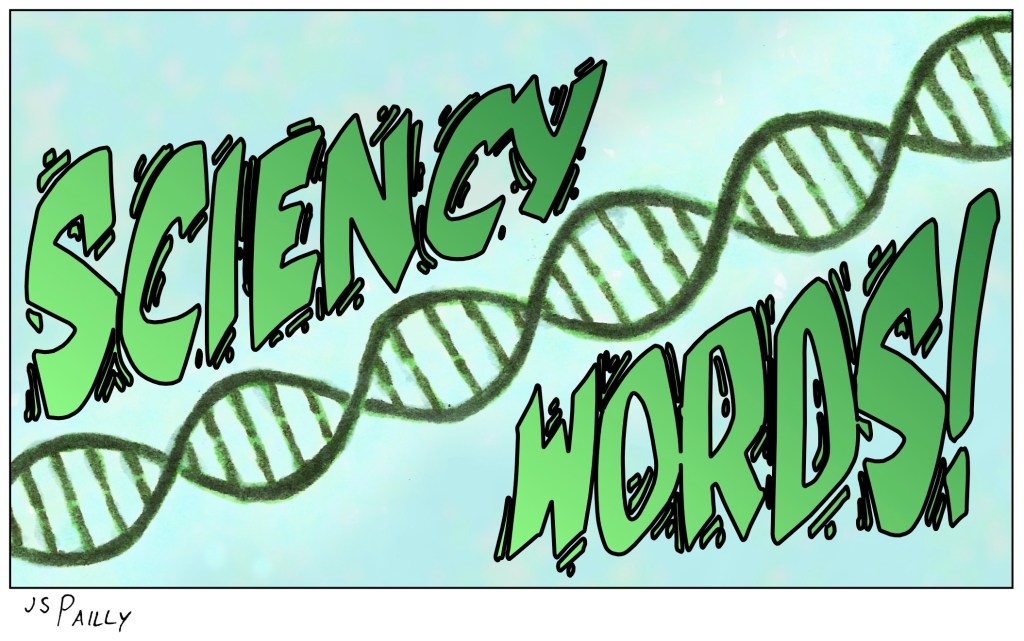
Hello, friends! Welcome to Sciency Words, a special series here on Planet Pailly where we take a closer look at the definitions and etymologies of science or science related terms, in order to expand our scientific vocabularies together. In today’s post, our Sciency Word is:
ORTHOGENESIS
Please be advised: orthogenesis is a discredited scientific hypothesis. It has been for almost a century now. That being said, the term has been coming up a lot in my research lately, and I do think there’s value in examining scientific hypotheses that didn’t make it, so to speak. I think looking at a rejected scientific hypothesis, like orthogenesis, can give us a better appreciation for how the scientific method works.
Definition of Orthogenesis: In evolutionary biology, orthogenesis was the hypothesis that life evolves in a straight line progression, from simpler organisms to more complex forms. Orthogenesis rather strongly implied that evolution is working toward some sort of predetermined end goal (i.e., intelligent life).
Etymology of Orthogenesis: The term was coined in 1893 by German zoologist Wilhelm Haacke, who was not convinced that natural selection alone adequately explained the evolution of complex life on Earth. The word orthogenesis is derived from two Greek words meaning “straight” and “origin.”
When you think about the history of life on this planet, orthogenesis may seem to make sense. Life started with just these simple microbes. Then life “leveled up,” and we got more complex multicellular organisms. And life kept “leveling up” after that to create fish and trees and dinosaurs and a surprising variety of crabs. And then came humans, the most “leveled up” of all Earth’s creatures.
But as scientists learned more about genetics, and as they pieced together more of Earth’s fossil record, this straight line progression idea made less and less sense. Evolution is a messy process. It works in fits and starts. It finds of-the-moment solutions without any regard for the future, leaving us with vestigial organs and other biologically inefficient stuff. Increasing complexity is not necessarily advantageous; sometimes the simpler life forms survive while their more complex cousins go extinct.
By the mid-20th Century, orthogenesis had been soundly rejected by the scientific community. Natural selection just made more sense in light of all the evidence scientists had accumulated since Wilhelm Haacke’s time. However, while orthogenesis has not been considered good science for many decades now, certain orthogenetic ideas still linger in popular culture. Whenever the mad scientist in a Sci-Fi movie starts ranting and raving about the “next phase of human evolution,” that’s orthogenetic talk. Or when you hear dialogue about how one alien species is “more evolved” than another, that too is orthogenetic talk.
A lot of popular misconceptions about science seem to come from science fiction. As a Sci-Fi writer myself, this is something I worry about. “Evolutionary paths” and “evolutionary destiny” are such common tropes; it’s easy to write them into a story without realizing you’ve done it. But I do not want to make these popular misconceptions about science worse, especially when it comes to a topic as controversial as evolution.
WANT TO LEARN MORE?
I’m going to recommend this article from tvtropes.org on “Goal-Oriented Evolution,” which does a good job summing up how Sci-Fi and other popular media keep getting evolution wrong.
I also highly recommend this research paper entitled “Fossil Horses, Orthogenesis, and Communicating Evolution in Museums,” because orthogenetic ideas don’t only linger on in Sci-Fi. They’re an ongoing problem in museums, school textbooks, and other educational resources as well.